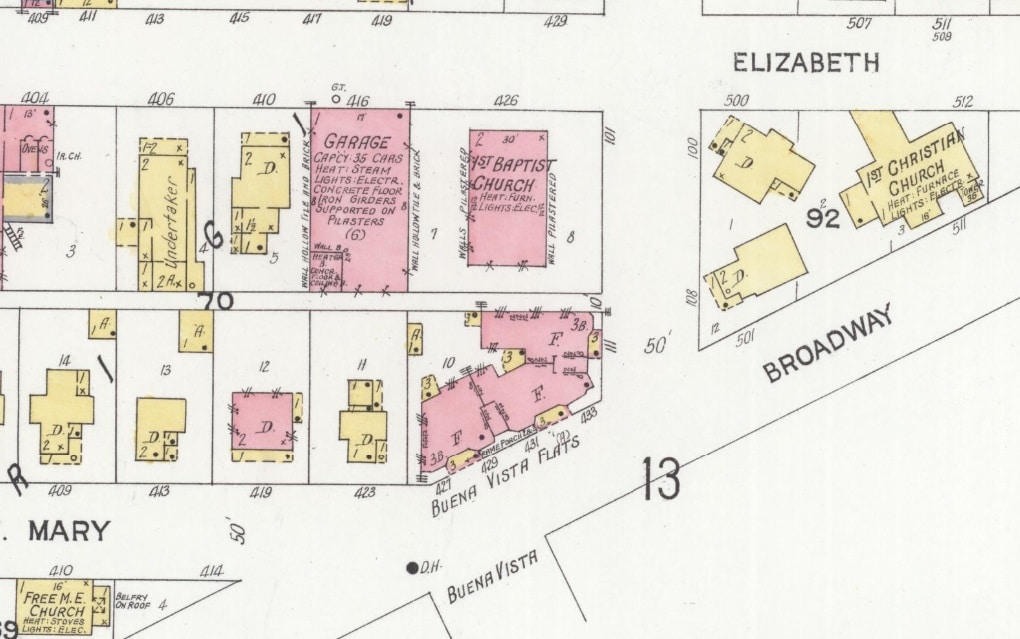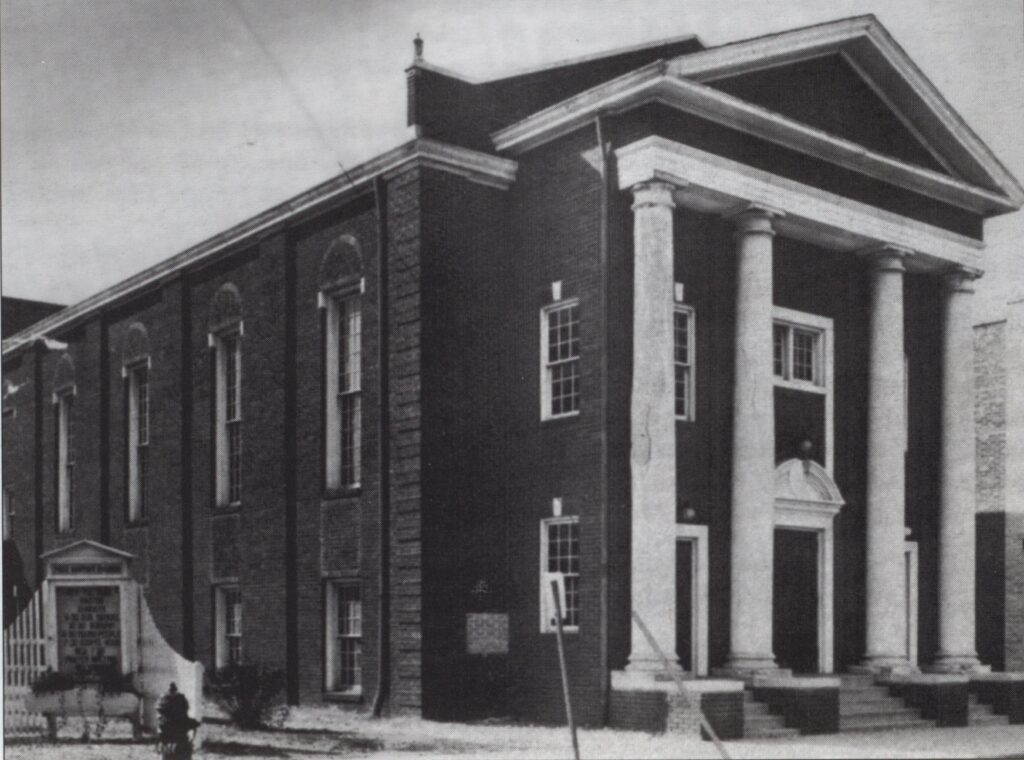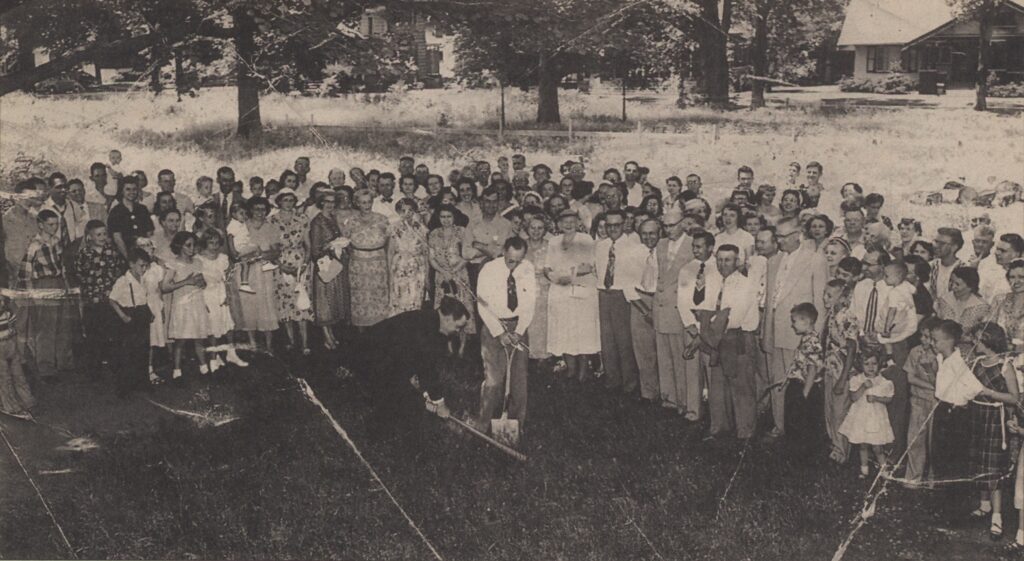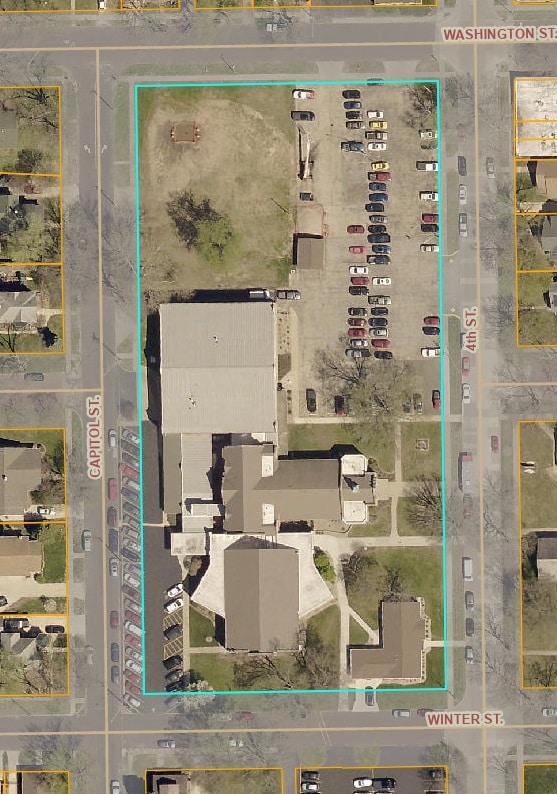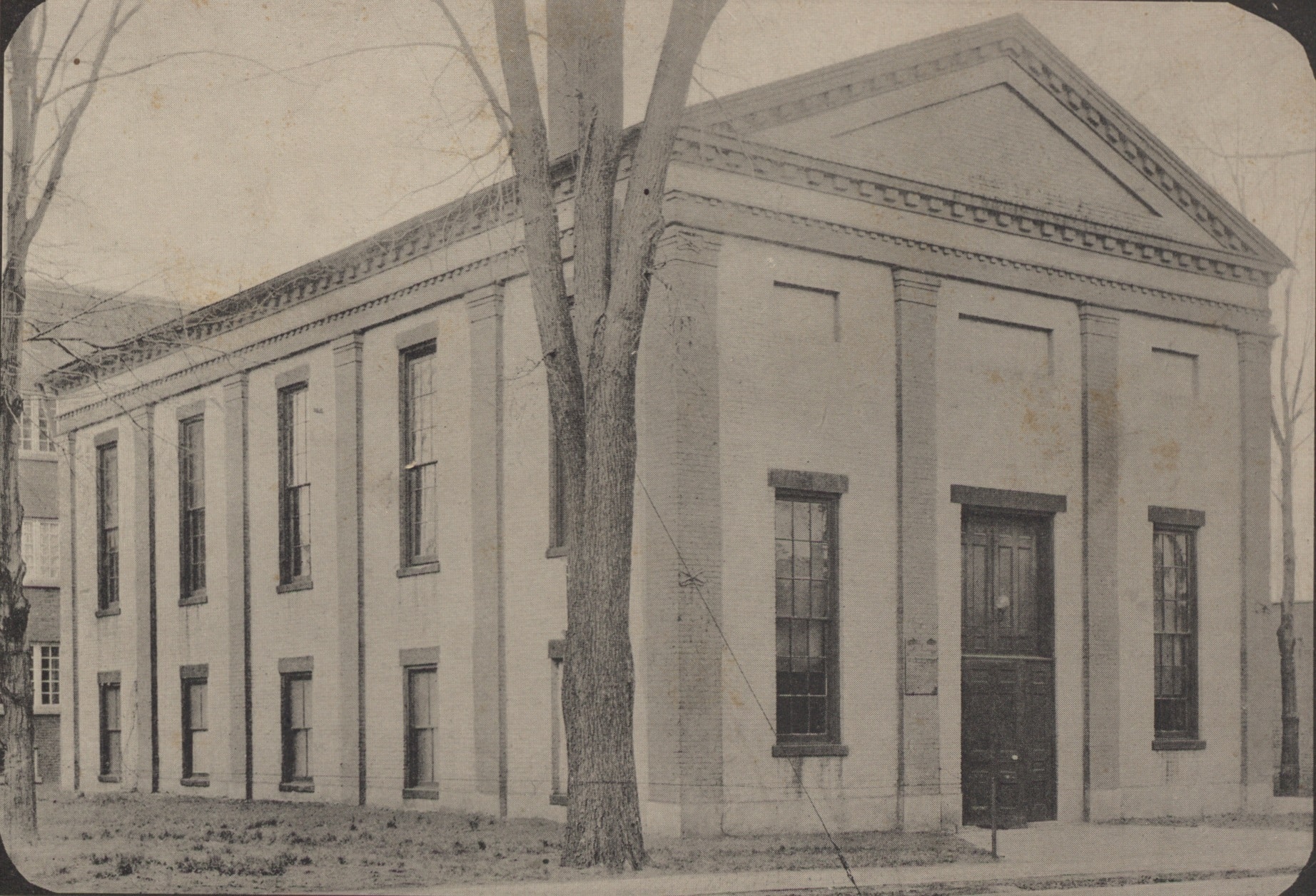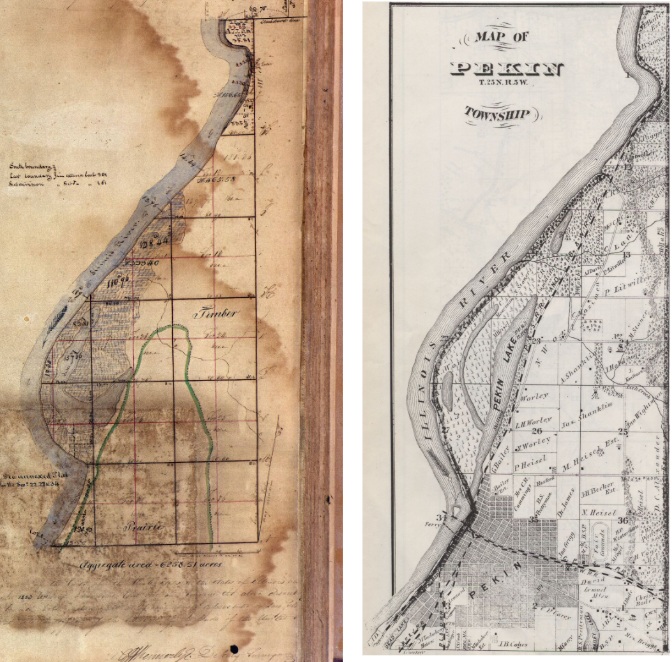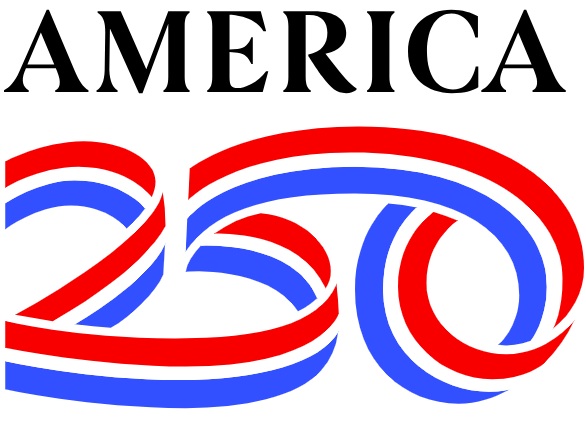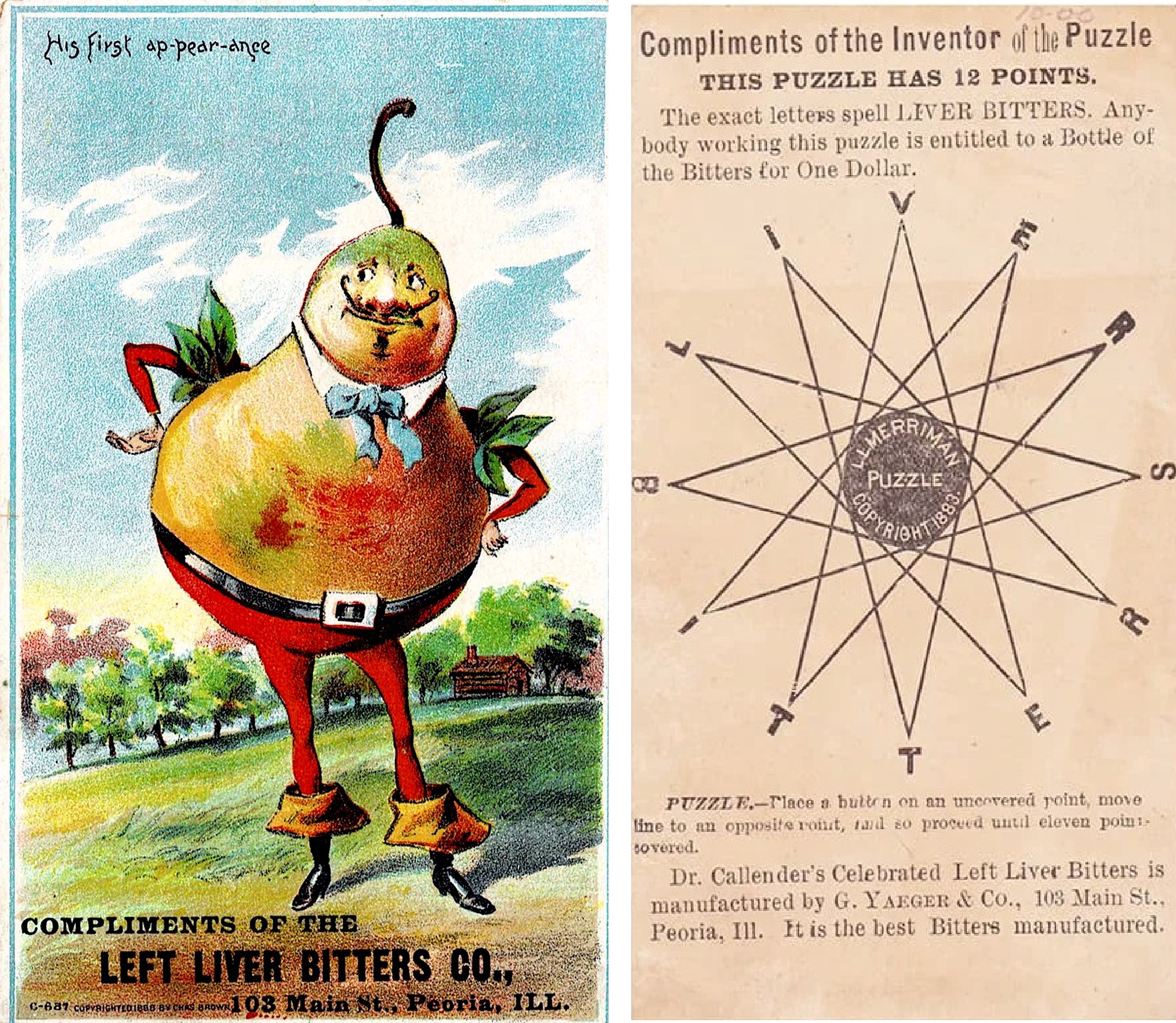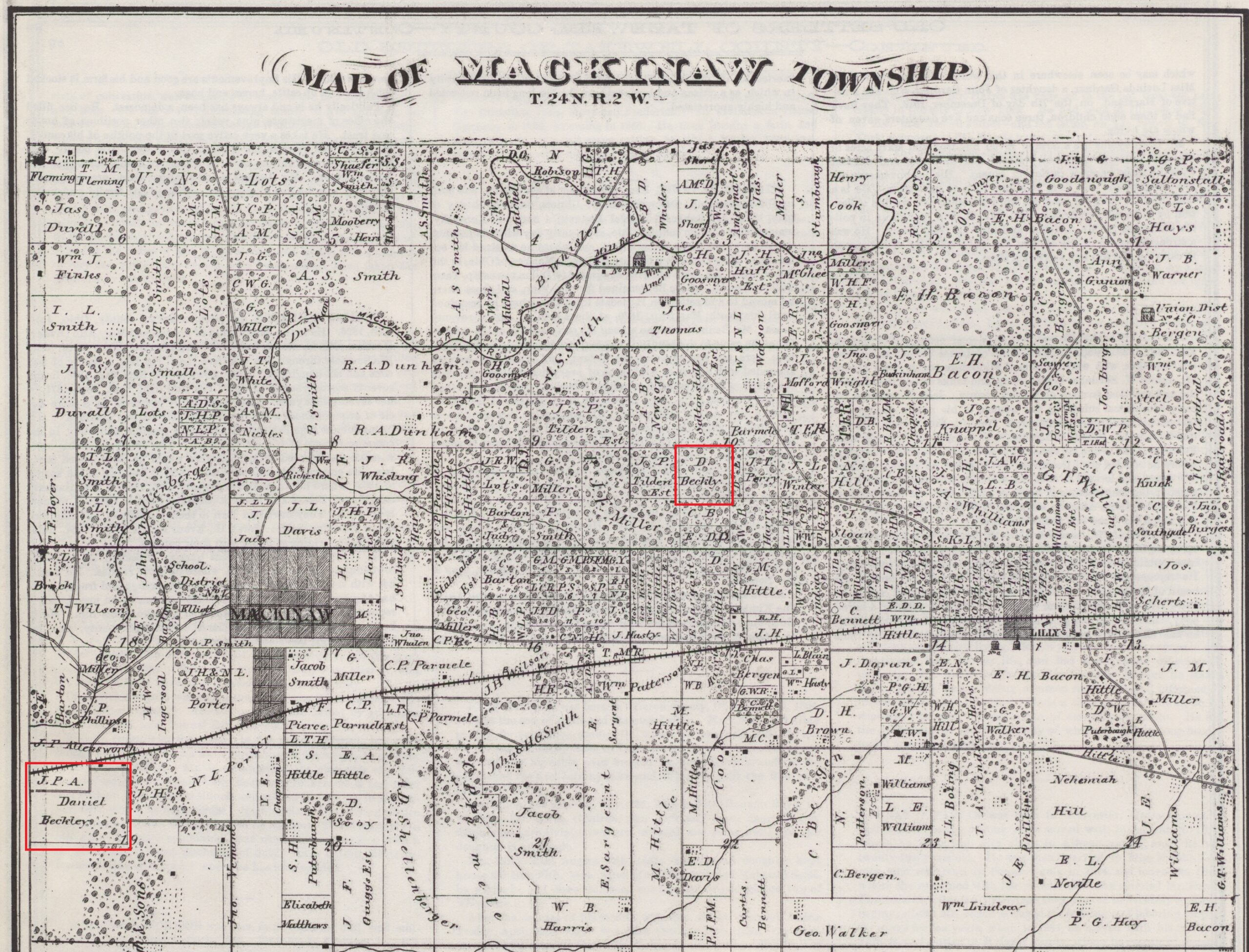One of Pekin’s oldest churches is preparing to celebrate its 175th anniversary later this month. First Baptist Church of Pekin, located at 700 S. Capitol St., traces its origins to the ministry of Rev. Gilbert Stephen Bailey (1822-1891), a missionary of the Baptist Home Mission Society in the U.S., who organized Pekin’s original Baptist congregation in 1850. The congregation founded by Rev. Bailey is now an independent Baptist church, pastored by Rev. Vernon Risner, senior pastor, and Rev. Johnathon Miller, associate pastor.
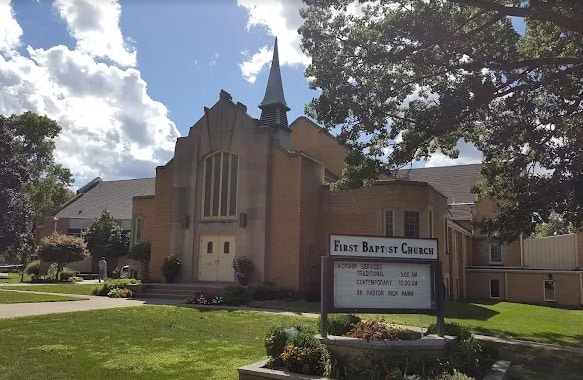
To mark the 175th anniversary of their church, the members of First Baptist Church will have special worship services at 9 a.m. and 10:30 a.m. Sunday, Oct. 12, with a luncheon to follow. For the past few weeks, and continuing up till Oct. 12, First Baptist has been recalling significant and notable moments of their history at their Lord’s Day services. The church will also host a family comedy night with comedian Andy Beningo, this Saturday evening, Oct. 5.
The seed that Rev. Bailey planted just one year after Pekin’s incorporation as a City took root and grew into a thriving church which later was able to send out branches, include Calvary Baptist Church (formerly called German Baptist) on Sheridan Road and Grace Baptist Church at the corner of South 14th and Derby streets, both of which are daughter churches of First Baptist Church.
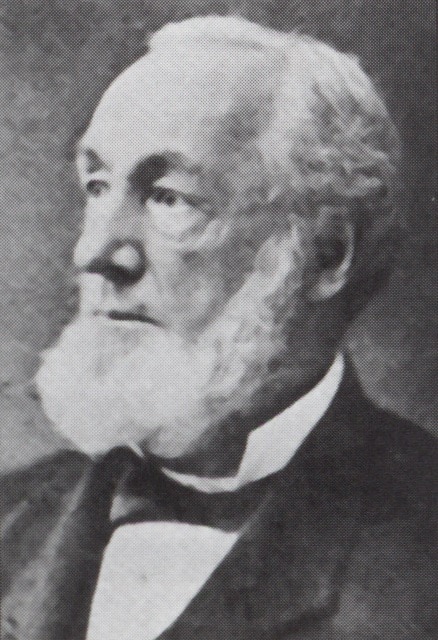
Though First Baptist Church has been located at 700 S. Capitol St. since 1953, it was originally located at the corner of Fifth and Elizabeth streets in a church building was that first erected in 1855 and formally dedicated in Oct. 1871, and then remodeled in 1926.
Among the many documents and sources on First Baptist Church’s history preserved in the Pekin Public Library’s Local History Collection, we have an undated newspaper clipping that seems to be about a century old, that provides a brief account of the founding of First Baptist and the construction of their first meeting-hall. The clipping says:
“In 1850, Jonathan P. Hall, Lemuel Allen, Mrs. [Margaret] Allen and Catherine Haas, were the only confirmed Baptists Elder Bailey found in Pekin. By 1852, the Baptist membership had increased to fifteen, when they were recognized as a church. Although agitated in 1851, no definite action was taken until 1853-54, when the erection of the above historic house of worship was begun. It was not completed until 1855.”
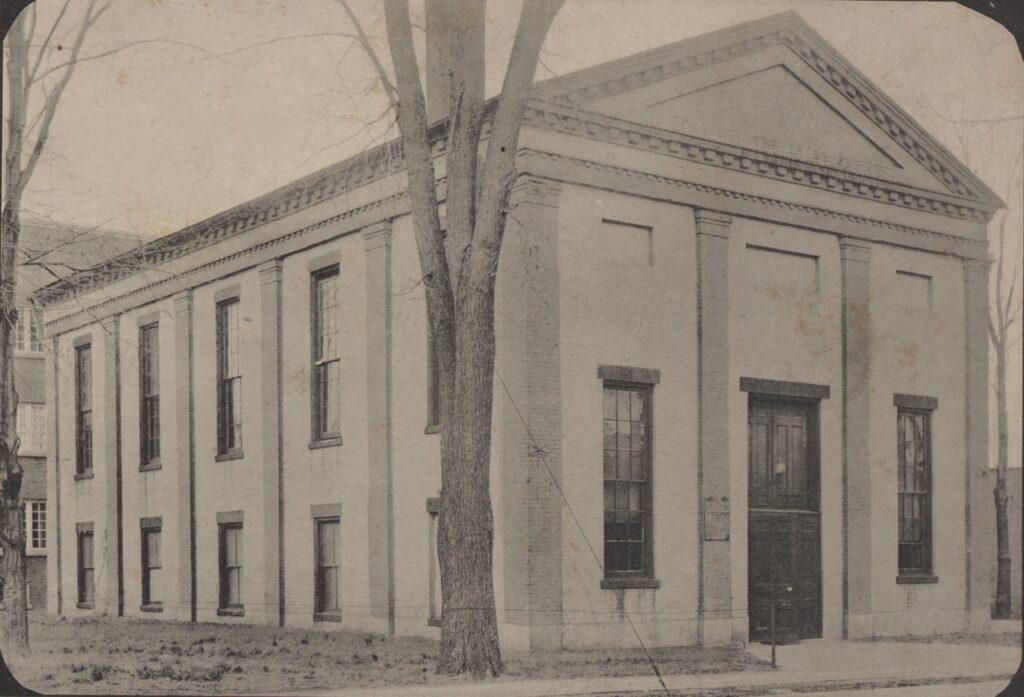
Rev. Gilbert S. Bailey was born 17 Oct. 1822 in Dalton, Pennsylvania, a son of George Anson and Elizabeth (Barnes) Bailey. His wife was Sarah Eloise Bunnell, daughter of David and Parthenia (Kellam) Bunnell. He and Sarah had six children: Eulalia Alice, Gilbert Ellis, Wayland, Howard B., Charles Anson, and William Carey.
Before coming to Pekin in August of 1850, Rev. Bailey ministered to a congregation of Baptists in Springfield, Illinois, then moved to Tremont to serve Baptists he found there, and then to Pekin by 1850. The church’s first baptism took place on the banks of the Illinois River on 7 Dec. 1850. Among those baptized that day was Mrs. Esther L. Hall. Bailey served as the church’s pastor from 1852 to 1855. During his years in Pekin, Bailey taught a private school from his home on Seventh Street, which later was the home of Pekin pioneer Ansel Haines.
After stepping down as pastor of First Baptist in 1855, Rev. Bailey and his family initially moved to Metamora, Illinois, but eventually moved West. Bailey and his wife eventually settled in Pomona, California, where he died 28 Sept. 1891. He and Sarah are buried together in Pomona Valley Memorial Park. Rev. Bailey’s epitaph read, “His Words Are His Monument.” His words include not only his sermons from throughout his ministry, but also his book, “History of the Illinois River Baptist Association, and of Its Churches,” which he published in 1857. The history of Pekin’s Baptist Church is found on pages 110-114 of Rev. Bailey’s book.
While serving in Springfield in the 1840s, Bailey became a personal friend of Abraham Lincoln, who was Bailey’s next-door neighbor. Though Lincoln himself never formally joined any church, most of his immediate family were either Baptists or Campbellites (Churches of Christ), and Lincoln’s own religious views (as reflected in his public speeches and writings) tended to be somewhat “Baptistic” or at least generally Protestant, though there is no evidence that Lincoln was ever baptized despite certain ministers later claiming to have baptized him.
In any case, Bailey’s friendship with Lincoln led to one of the most notable events in First Baptist Church’s history. Here is the account of that event, as told by Rev. Bailey’s widow Sarah in a letter that she wrote in 1900, which was read at the church’s official 50th anniversary celebration on New Year’s Day 1901.
“In those pioneer days there was no building fund, and it was often a hard struggle for a new church to build the much needed meeting house. After work had commenced on ours in Pekin, my husband went to Springfield to obtain help from our personal friends. He met Abraham Lincoln on the street and there was a cordial greeting. We had lived in Springfield, next-door neighbors, and were warm friends. Mr. Lincoln inquired how the Baptist church was progressing in Pekin, and Mr. Bailey told him of the building of the meeting-house and his errand to Springfield. Mr. Lincoln asked to see the subscription book, and unsolicited, placed his name upon it for ten dollars. He said he had not the money with him but would pay it when he came up to Court. A few months afterward he made a pleasant call at our house and paid the ten dollars. My good children prize the old subscription book with ‘A. Lincoln’ written in his own hand. The name of the grandfather of our Secretary of State, Hay, is also there.”
Based on the known activities and travels of Elder Bailey in those years, it must have been in the late spring or the summer of 1853 that he met with Lincoln in Springfield and obtained his pledge of $10 toward the construction of the Pekin Baptist meeting-house. The current whereabouts of Rev. Bailey’s church building subscription book is unknown. It might still be in the possession of his descendants. Besides this link to the Great Emancipator, First Baptist Church also counted among its early members and Deacons none other than Dr. Daniel Cheever, abolitionist and Underground Railroad conductor, and one of the original members of the Union League.
Another early Pekin historical source that tells of First Baptist Church is Omi Root’s 1861 City Directory of Pekin, which succinctly describes the church in these words:
“Organized November 7, 1850. House of worship is situated on the corner of Fifth and Elizabeth streets. Rev. W. W. Sawyer, Pastor. Hours of service, 10 1/2 A.M. and 3 P.M. Number of members, 30. Sunday School organized in January, 1851. L. Allen, Superintendent. Meets at 2 P.M. Number of teachers, 14; scholars, 140. Number of volumes in Sunday-School Library, 200.”
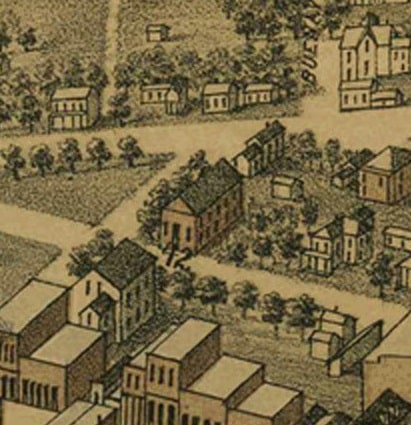
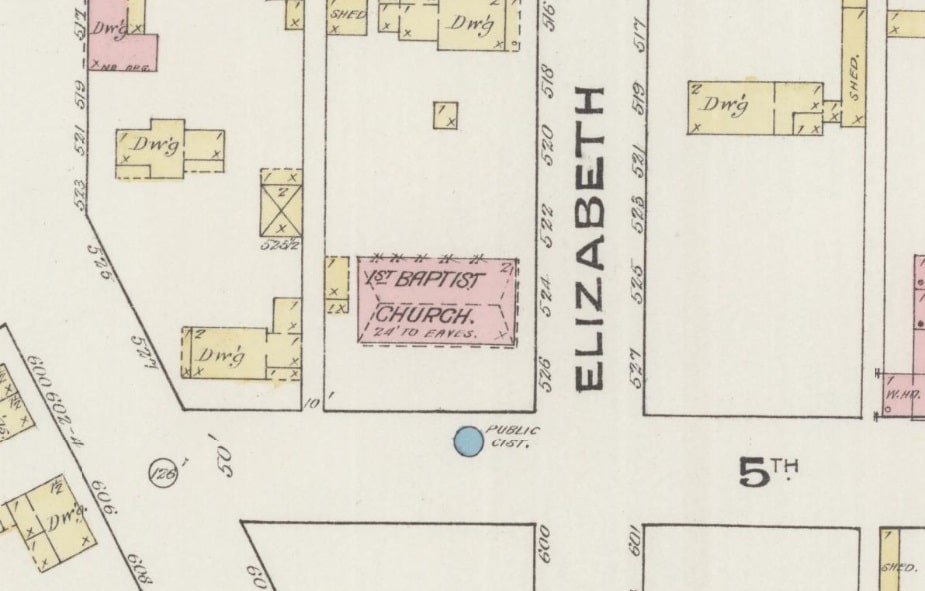
Charles C. Chapman’s 1879 “History of Tazewell County,” page 593, also provides a short paragraph describing “Pekin Baptist Church”:
“Pekin Baptist Church was organized in 1850, by Rev. G. S. Bailey, with four members. These were Mr. and Mrs. Lemuel Allen, Mr. Hall and Mrs. Haas. The congregation grew and prospered and in 1855, built a house of worship. A fine large brick, 40 by 70 feet, with basement, was erected. The audience room is reached by a short flight of stairs from an ante-room into a vestibule under the gallery of the main room.”
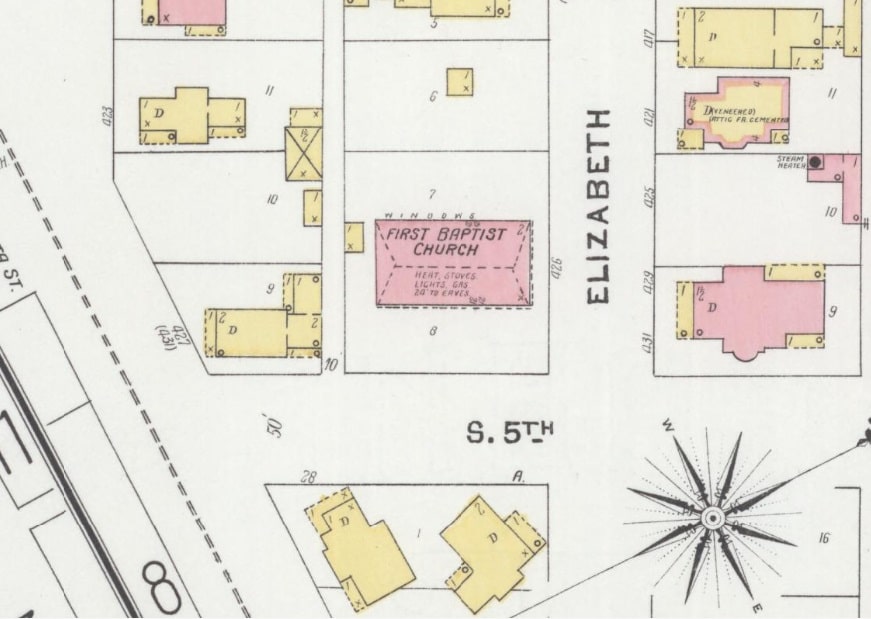
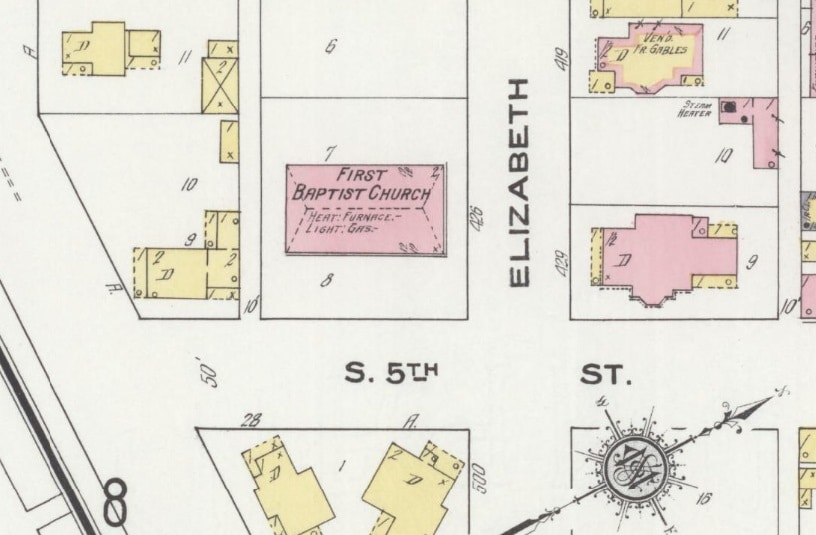
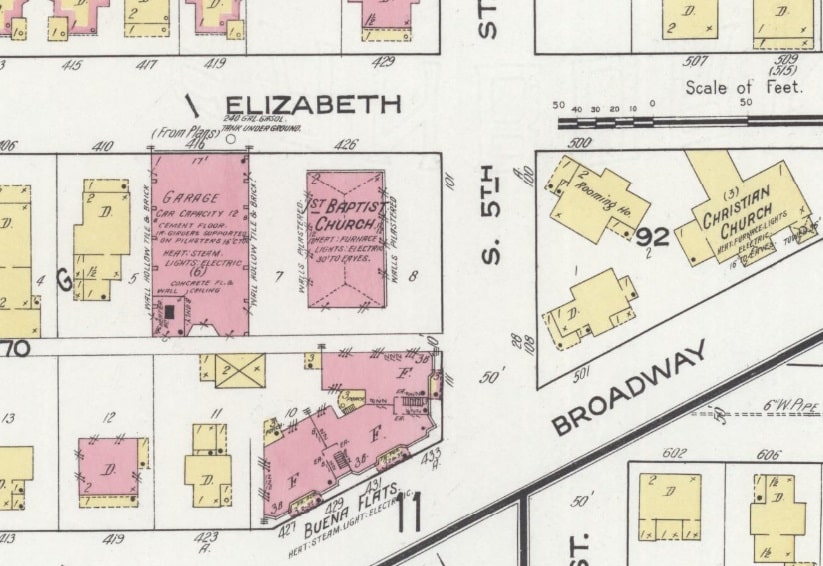
Ben C. Allensworth’s updated “History of Tazewell County” (1905), pages 924-927, devotes three lengthy and detailed pages to the history of First Baptist Church. Most of Allensworth’s account derives from a history of the church that had been compiled by one of their prominent members, Mary E. Gaither (1852-1945), whose father William had been a Deacon in the church. Mary served as First Baptist’s Recording Secretary, but she is also remembered as the mother of Pekin’s Carnegie Library, for which she also researched and wrote the library’s early history.
A condensed version of Gaither’s history of First Baptist Church was printed in the “Directory of the First Baptist Church, Pekin, Illinois,” compiled by the church’s pastor Rev. Herbert S. Morrill and the church’s Sunday School superintendent Sam R. Derrick and published in August of 1914. Gaither’s history as found in the 1914 church directory is here reproduced in full:
The First Baptist Church, Pekin, Illinois, organized 1850 under Pastor Gilbert S. Bailey, missionary of the American Baptist Home Mission Society, was reorganized in council in 1852. Revs. Henry G. Weston, Peoria, and S. S. Martin, Tremont, among the pastors present. Our church thus became a branch of the Illinois River Association, now the Bloomington Association.
Ground was purchased in 1852 for $330.00 and work begun in 1854. The original plan included a spire, changed later through scarcity of funds.
The upper room was first built with a north gallery, reached by two spiral stairways, which was later removed, and the choir recess built in, leaving one stairway on each side.
A massive pulpit in the south end, lighted by a lamp on either side, bracket lamps on the walls, and slender benches, was the furnishing, till 1871, when the formal dedication was held. In preparation for this service nearly $5,000.00 had been expended, in finishing and furnishing — about $800.00 of which was earned by the women workers of the church. Also the Bible School workers and friends in other churches gave practical aid.
In 1894, the two south rooms were partitioned off from the main audience room, and since that time has been a gradual adaptation of means to our need, as Providence has seemed to favor our efforts.
Our church stands, well-built and commodious, with modern improvements, centrally located, the oldest church building in town, a testimonial to the history of our community, its records carefully preserved for sixty-four years.
These have been years of great struggle and self-sacrifice, but we have been sustained by faith in “the doctrine once delivered to the saints,” in “the hope of our calling,” charity for the world about us, and assured of the fact that our work has been greatly blessed of Heaven.
While our church was yet unfinished, we were welcomed on various occasions, to hold services in other churches, also in the (then new) Court House. Here Elder Bailey met his people for some months, and organized the Bible School.
He also conducted a classical private school in Pekin, and both here and in Tremont his influence left a permanent impress.
In the fifties Abraham Lincoln, lawyer, of Springfield, Illinois, and a personal friend of Rev. Bailey, gave a liberal sum of money “for the Baptist Church of Pekin.”
Most fittingly it followed that one of the finest eulogies upon the death of Lincoln was given from our pulpit by our pastor in 1865, Reverend William Roney.
We hold in highest esteem the work of former pastors, among whom may be mentioned, besides, Reverends William Roney, A. A. Russell, H. E. Norton, J. B. Lee, J. V. Cody.
Among the names of young ministers here ordained stand those of Benjamin Gray, R. R. Coon (whose work of usefulness in the West is widely known) and Harrison Sawyer, pastor of our own church for some time.
These services brought to our city the active pastors of the state, including such names as Rev. John Packer, many years at the head of a Baptist school in India; Rev. Justus Bulkley, long identified with Shurtleff College, Rev. Charles E. Hewitt, then of Bloomington, besides many others.
The name of our beloved retired Pastor and Deacon Emeritus, Elder F. M. Smith, is recorded on our “sunshine page” along with those of blessed memory.
Our first Deacons were Lemuel Allen, William Gaither, Jonathan Hall, Dr. Daniel Cheever, and their families, workers in the Bible school, together with Hon. John M. Bush, Miss Catherine Haas, Mr. John Musselman, Mrs. Hannah Haas, Mr. and Mrs. H. Sperry, E. W. Rossiter.
Mr. and Mrs. Burdette, Ward, Evans, Fisher, and our beloved sister Josephine Goodheart Allen, for years active in our Bible School, whom we welcome home every summer from Frances Shimer School, at Mount Carroll.
The German Baptist Church, organized in 1869, included many who, having been faithful workers with us, saw here a larger opportunity for service, and though our numbers were reduced, time has justified the wisdom of their action.
At the second meeting in Pekin of the Bloomington Association, we had the honor of welcoming, among others, Rev. W. B. Riley, then of Bloomington, Rev. E. J. Thomas, of Atlanta, and Miss Mary G. Burdette, whose permanent monument stands in Chicago, the widely known Baptist Missionary Training School, where young women are taught, scientifically, all branches of mission work, for all parts of our country, among all classes of people.
At the Fiftieth Anniversary of our church, in January 1901, Pastor F. M. Smith in charge, messages of rare and unusual interest were showered upon us, from friends in distant lands.
We quote from a few, in conclusion. One sister wrote as follows: “As a child I remember Pastor Bailey told of the question put to him, when he went to the Eastern states to raise money for the first work done on the church in Pekin: ‘What is the character of the people in the Western states?’ — he replied, ‘All the pluck, energy and enterprise of New England is represented there; the drones had no life enough to move westward.'”
The widow of Rev. Bailey wrote to Deacon Allen that “in our upper room, my husband’s study, the resolve was made, by three brethren present, that the aid of Stephen A. Douglass shall be sought, to establish a school for students of the ministry in Chicago. Thus, near Douglass Park, known as the old Seminary, was later known as the Theological School of Chicago University.”
One brother wrote thus, “I am glad there are still hearts as brave, and hearts as strong, as in my youthful days; that the lamp still burns, and that no wanderer hastening, as I was, along a perilous path, is left to stumble to his eternal hurt. For there I found, thirty years ago, the fellowship, nurture, and counsel, that I can never forget.”
May we continue to write such records on the hearts of those about us, for thus only shall our names be written in the book of Eternal Life.
